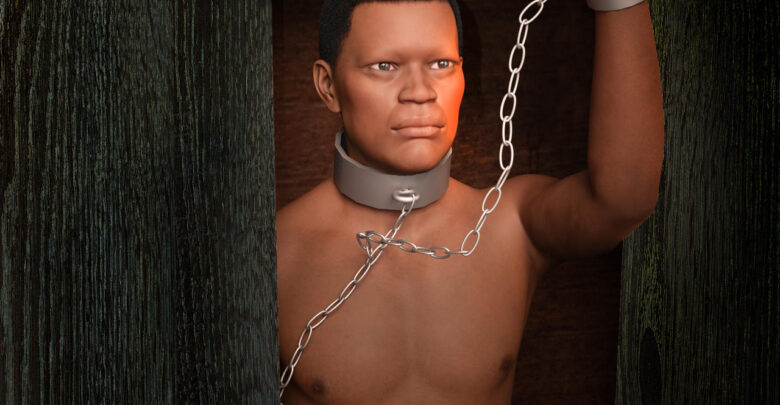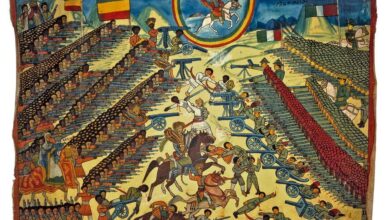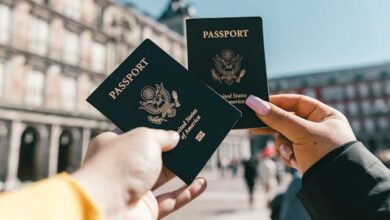The Inconsistencies of Kunta Kinte’s Muslim Origins

In addition to creating paradoxes that are neither addressed nor clarified in Roots, Kunta Kinte’s depiction as a Muslim instead of an adherent of an indigenous African religion distorts the overall impact of Arab Islam in Africa by failing to acknowledge the part that Islam played in the centuries-long enslavement of Africans both before and after the Transatlantic Slave Trade.
Also Read: The Slave Trade in Africa: The Atlantic Slave Trade
The Inconsistencies of Kunta Kinte’s Muslim Origins
Kunta Kinte is shown at the start of Roots as leading an independent, perfect life in Africa. Throughout Roots, the protagonist’s ceaseless search for freedom as a slave in America is motivated by this feeling of liberation that has been embedded in his consciousness.
Therefore, in Roots, religion and culture serve as the foundation for Kunta Kinte’s unstoppable African Spirit and Consciousness.
Thus, it appears to us from Roots that Kunta Kinte’s Free Spirit mostly stems from his family’s faith and the faith of the Mandinka people, who are devout Muslims in Africa.
Kunta Kinte’s attendance in the Mandinka adult initiation ritual, however, indicates that, despite the Mandika people‘s devotion to Islam, Kunta Kinte and the Mandinka People nevertheless continue to practice some pre-Islamic traditional African religious ceremonies.
Despite the fact that the Mandinka Initiation Ceremony is obviously not Islamic and is exclusively, at least from a Muslim viewpoint, Pagan, Roots does not address the wider ramifications or significance of this hybrid religion among Africans in Africa or show this as a contradiction.
Kunta Kinte’s Mandinka Religion
Kunta Kinte’s hybrid, strange, and mysterious version of Mandinka religion seems to have one distinct purpose: it establishes both Kunta Kinte’s and the Mandinka People’s humanity by the time Kunta Kinte is kidnapped and sold into slavery.
It is possible to argue that by portraying Kunta Kinte as a Muslim, the audience is able to empathize with him and the Mandinka more easily than they otherwise would have if Kunta Kinte had been depicted as a practitioner of one of the indigenous African religions of the period, such as Voudon or Ifa.
When Kunta Kinte first arrives in America, things get weirder. We see scenes where Kunta Kinte remembers his native Africa and prays in the traditional Muslim manner, facing Mecca, while also giving his child Kizzy an African name and making sure she receives it in the same traditional manner that Kunta Kinte did.
Also Read: How Africans Were Lured into the First Slave Ship’ Jesus of Lubeck
Kunta Kinte Descendant
But neither Chicken George nor Kizzy, who never mention the Islamic Faith followed by their Forefathers before to Kunta Kinte’s slavery, make any attempt to maintain the Islamic Faith that Kunta Kinte and the Mandinka likewise practiced before Kunta Kinte was enslaved.
Additionally, none of Kunta Kinte’s descendants appear to be trying to learn the Koran in America, despite the fact that this was a component of their father’s religion in Africa.
These unresolved contradictions in the 1977 Roots TV Series’ narrative contribute to the unexplored legacy of Arab Islam in Africa, which is completely absent from the discussion other than to romanticize the influence of Arab Islam in Africa and to humanize Kunta Kinte for modern audiences.
This is significant since the 1977 television series Roots focused on slavery, which started with Arab Islam in Africa rather than the Transatlantic Slave Trade as it is depicted in the show.
The influence of Arab Islam in Africa
The influence of Arab Islam in Africa According to John Alembillah Azumah, Muslims from Arabia were already heavily involved in the Trans-Saharan Trade, which included the sale of slaves, in West Africa centuries before the Trans-Atlantic Slave Trade even got underway.
Furthermore, the introduction of Islam to Africa sparked Jihads by newly converted Islamic nations like Mali and the Fulani against other, weaker nations they had subjugated and enslaved in the name of Islam, then used those nations to enforce Islamic law.
The Arab invasion of North Africa was another type of colonization that happened in the seventh century when Arab Muslims from Saudi Arabia overran Egypt and all of North Africa, driving out the Berbers and Ethiopians who had previously lived in this area.
From this angle, it is clear that slavery played a significant role in Islam’s interactions with Africa, which in turn caused political unrest on the continent as Islam supplanted native institutions, either through the Arabs themselves or through African states that had made Islam their official religion.
Therefore, prior to early European engagement in the slave trade beginning in the 14th and 15th centuries, slavery in Africa was primarily an Islamic institution from the 9th through the 13th centuries.
The argument in favor of this stance is strengthened by the fact that the East African Arab Slave Trade, which took place along the Zanzibar Coast, is also included in the Arab Slave Trade in Africa.
Also Read: Black slave Thomas Fuller, known as the Human Calculator
In summary
Ultimately, in its attempt to humanize Kunta Kinte for modern audiences, the 1977 Roots TV Series seems to oversimplify and gloss over the influence of Arab Islam in Africa.
The harsh truth is that rather than being captured as a slave himself, Kunta Kinte is more likely to have sold other Africans into slavery if he was a Muslim.
Even yet, the 1977 Roots TV Series is nevertheless a powerful depiction of the trauma and cognitive dissonance that African slaves on North American slave plantations experienced as a result of the Transatlantic Slave Trade.
It’s possible that depicting Kunta Kinte as a Muslim was in line with pro-Black resistance movements prevalent in America at the time, such the Nation of Islam, which was attended by well-known individuals like Malcolm X.
Kunta Kinte Portrayed as a Muslim on Modern American post-Civil Rights
In the modern American post-Civil Rights milieu in which the Roots TV Series was filmed in 1977, Kunta Kinte was therefore shown as a Muslim, positioning him as a counterblast against White Supremacy.
But this misrepresents the truth of how Arab Islam affected the issue of slavery in Africa, which is the core theme of the 1977 television series Roots.
In addition, although Kunta Kinte and the Mandinka are humanized on screen by being shown as Mulsims, this portrayal also highlights unresolved conflicts in the larger story of Roots.
Specifically, the importance of Kunta Kinte’s Muslim background to his offspring and their struggle for independence suddenly disappears from the story of Roots.





